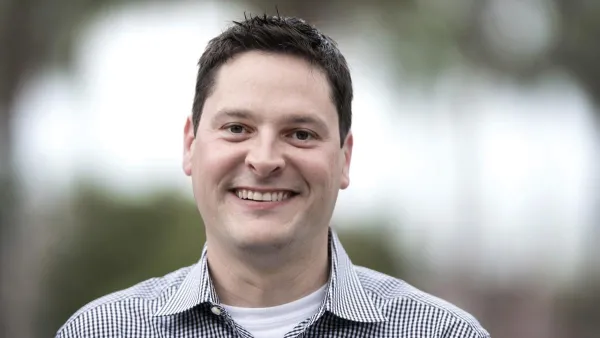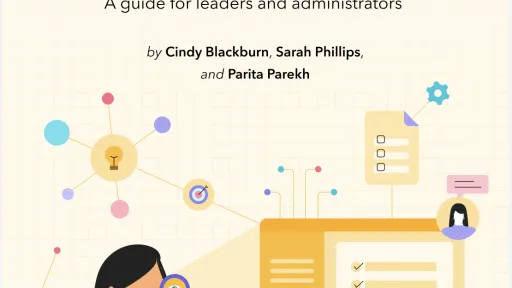David Boxer, TLIS, knows that he doesn’t know what he doesn’t know, so to fill the gaps, he leans on his dynamic team at The Blake School in Minneapolis, Minnesota. As chief information officer, Boxer exemplifies a trust-centered leadership approach while continually exploring and pursuing new ways to grow — lately, that’s been through ATLIS. So, Access Points met with Boxer in late 2024 to learn more about his perspective on technology leadership.
Access Points: How did you make your way to The Blake School, where you’ve now been for 13-plus years?
Boxer: A few parts of my meandering path have been quite transformative. My career journey began as a college-age student working as a young teacher in the Breakthrough Collaborative, hosted in about 30-plus independent schools nationwide and a couple of sites worldwide. It’s a program that serves middle school students. It is taught by young teachers from high school to college and then led by seasoned mentor teachers, professional teachers, and administrators. I have to say that my experience as a college-age student — getting to serve middle school students in college-bound high schools ranging from New Orleans, Denver, and New York City — was the turning point for me. The Breakthrough Collaborative is a mashup of the best summer camp with a joyful, creative, rigorous academic experience. From the earliest of those days, I learned a lot about curriculum design, lesson planning, and effective pedagogy. It was probably the most important experience that has guided me throughout my career — one that showed me the value of building strong relationships with students. That foundation probably has guided my approach to education and has stuck with me throughout my career.
In my last Breakthrough Collaborative experience at The Town School in New York City, I had the opportunity to merge my passion for technology with the joy of teaching reading and writing. In that first professional stage of my teaching career, I discovered how technology can help amplify student voices, foster collaboration, unlock creativity, and give kids opportunities around authorship.
Before I came to Blake, I got a call, while I was looking for English or social studies positions, from what ended up being a colleague at the Windward School in Los Angeles. The school was in the infancy stages, sort of a primordial stage, of rethinking the role of a library in a secondary school. I had a remarkable opportunity to co-found the Center for Teaching and Learning at Windward. What made that experience unique was bringing together a group of inspiring, creative teachers who were brave about thinking about their professional learning goals and how they wanted to transform the experiences in the classroom. The group included incredibly talented educators, research librarians, ed tech, and IT folks. A shared love of libraries and research — along with a shared priority around providing space and time for teacher-leaders to collaborate — allowed that program to thrive and live on long past where I was able to contribute.
Access Points: Can you explain more about how your educational background prepared you for the tech side of things?
Boxer: What I share with my team is our job to serve the school community. Our relationships with teachers, students, and families are the most essential things that should lead our work. If we are making the classroom experience sticky rather than seamless or difficult rather than easy, that disrupts teachers’ relationship with students. How should we use technology to positively shape the experience of students and teachers in and out of the classroom? Those decisions should always involve teachers and students. We should never be making those decisions in isolation.
A combination of teaching earlier in my career and the privilege of collaborating with talented teachers, IT professionals, librarians, instructional technology coaches, and academic and operational leaders has prepared me to lead in this space.
Access Points: How are you leading ed tech transformation at Blake?
Boxer: A combination of teaching earlier in my career and the privilege of collaborating with talented teachers, IT professionals, librarians, instructional technology coaches, and academic and operational leaders has prepared me to lead in this space. In every independent school I’ve had the good fortune to work in, I had the opportunity, either formally or informally, to partner closely with the directors of information technology. Those colleagues and the ATLIS community have provided invaluable opportunities to consider how we govern and protect teacher and student family data. It’s also critical to foster an environment where IT team members feel like they can thrive. One of the ways I can contribute to the team is to be aware of the expertise of my colleagues. To be frank, I’ll never have the same technical expertise as a team colleague, and I think that’s exactly as it should be. My role is to ensure the team works effectively and collaboratively. My job is to ask thoughtful questions, to look at both the “trees and the forest,” to nurture a culture of teamwork, and then, most importantly, to try to the best of my ability to stay deeply connected to the school community we serve.
Access Points: Why are peer coaching and programs such as the ATLIS Leadership Institute key to helping ed tech professionals grow?
Boxer: I’d say both programs are essential because if well designed and well executed, they provide opportunities for us to learn, to reflect, and to be able to iterate and innovate in a discursive or collaborative environment. For example, in my personal experience, when I was a mentee in the peer-coaching program, I worked with a talented director of technology. I could share complex issues I had never encountered before, and his wisdom and experience would help me think through the nuances and sometimes provide very practical resources. I didn’t feel like I was doing the job in isolation. When these programs work well, they foster a culture of shared expertise where we can exchange ideas and leverage each other’s expertise as professionals. The ATLIS Leadership Institute helped me to see perspectives and contexts that as an individual I wasn’t experiencing. Suppose you’re an ed tech leader at a small school in California. In that case, that will look different than my experience as an IT director in the Midwest, which will look different than a school in Florida. I see the institute almost as a “makerspace.” You bring all these wonderful people together to tackle the challenges that every person in this role in an independent school will encounter.
The one thing that is tried and true more than ever is that the environment continues to evolve and change. Things that I wouldn’t have even considered 10 years ago, like cybersecurity, have become something I now consider one of my primary roles. Again, I’ve been able to lean on the talent of other team members when determining what outside resources we need because we’ll never have the expertise to tackle that alone. The ATLIS Leadership Institute prepares you for hairy problems that are contextually based and that will have answers based on the needs and resources of the school.
Access Points: What does ATLIS’s new Technology Leaders in Independent Schools (TLIS) certification mean to you, and why should other independent school technology leaders aim to earn their TLIS?
Boxer: One of the things I value is trying to figure out what you don’t know and being curious about how you can grow in that area. I feel fortunate that I’ve been given a great deal of autonomy and a lot of support from talented academic leaders, including teacher-librarians, instructional technology coaches, and IT experts. But you don’t often get feedback about an area in which you might need to grow to provide better leadership and better support the school. And I think one of the things I started to engage in the TLIS — not just the certification but the preparation program — is that it reminded me why I care about the Charlotte Danielson framework. Frameworks help you become a better teacher. The TLIS framework offers evidence-based practices — the prep program and the scenarios — that you will likely encounter in this role. I can become a better leader by understanding the areas where I thrive and need to grow to serve my school community more effectively. So, the four domains around professional development, operations, independent school governance and leadership, technology for teaching and leading, and all their subdomains are true to what we do. The certification provides this great mirror. For example — and I’m not trying to toot my own horn — it’s not a surprise that technology for teaching and learning and professional development are areas in which I thrive. It’s beneficial to know that the areas where I could grow focus on independent school governance and certain aspects of operations.
What I find most valuable about the TLIS certification is how it connects me to an evidence-based framework developed through the collective expertise of the ATLIS community and its talented leaders. It offers excellent resources and provides a reflective mirror, helping me assess how to refine my craft, elevate my leadership, and identify areas for growth. Ultimately, this process enables me to better serve my team, the school, and our teachers, students, and families. I wholeheartedly recommend the TLIS program to anyone interested, as a current IT leader or someone interested in becoming an IT leader, to participate in the certification and preparation aspects. It’s a great opportunity to reflect on one’s practice. For example, I’ve changed my professional learning goals to align with the major domain or subdomains of the TLIS. I also use the framework to inform how I craft agendas for my team and for other academic leaders, like our head of school. It helps me stay mission-focused on leading and communicating in these different domains.
Access Points: What motivates you outside of work?
Boxer: I’m a very proud parent of a 15-year-old young man and an 11-year-old daughter. I love spending time with my family. I love being outdoors in Minnesota. One of the things I was first charmed by here was seeing — deep in the depths of winter in February — people running around the lakes, snowshoeing, and cross-country skiing. I saw a dad walking with his 5-year-old daughter holding their hockey sticks. Minnesotans embrace all seasons, and I’ve come around to appreciating the changes in the seasons. Then in the summertime, it’s such a beautiful place to be. I’ve never lived in a city with such an incredible biking trail system. I enjoy canoeing on the city lakes, traveling “up north,” and being with friends. When I get a chance to travel to new places, it’s ideal to go to other countries or my favorite U.S. place, New Orleans. I enjoy engaging in things I’ve never tried, from learning how to craft cocktails to falling deeply in love with Minnesota’s sauna culture.
Get to Know David Boxer, TLIS

Hometown: Ann Arbor, Michigan
Education: B.A., history and Afro-American studies, minor in integrated liberal studies in global studies, University of Wisconsin-Madison; M.A., applied educational psychology, reading specialist, Teachers College, Columbia University
Hobbies: Cycling trails, canoeing, traveling, spending time with family and friends, listening to music
Favorite Quote: “The paradox of education is precisely this — that as one begins to become conscious one begins to examine the society in which he is being educated. It is your responsibility to change society if you think of yourself as an educated person.” — A Talk to Teachers by James Baldwin, reprinted in The Price of the Ticket: Collected Nonfiction 1948–1985.
Fun Fact: Since moving to Minnesota, he has immersed himself in all that sauna culture offers.



